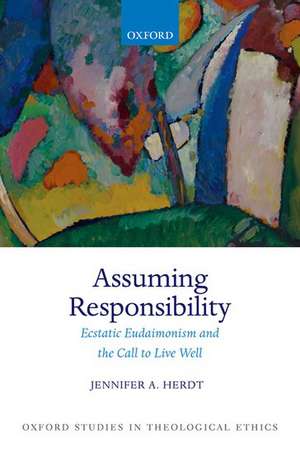Assuming Responsibility: Ecstatic Eudaimonism and the Call to Live Well: Oxford Studies in Theological Ethics
Autor Jennifer A. Herdten Limba Engleză Hardback – 31 mai 2022
Preț: 582.05 lei
Preț vechi: 698.18 lei
-17% Nou
Puncte Express: 873
Preț estimativ în valută:
111.38€ • 117.12$ • 92.03£
111.38€ • 117.12$ • 92.03£
Carte disponibilă
Livrare economică 17-22 martie
Preluare comenzi: 021 569.72.76
Specificații
ISBN-13: 9780192849205
ISBN-10: 0192849204
Pagini: 288
Dimensiuni: 164 x 241 x 22 mm
Greutate: 0.59 kg
Editura: OUP OXFORD
Colecția OUP Oxford
Seria Oxford Studies in Theological Ethics
Locul publicării:Oxford, United Kingdom
ISBN-10: 0192849204
Pagini: 288
Dimensiuni: 164 x 241 x 22 mm
Greutate: 0.59 kg
Editura: OUP OXFORD
Colecția OUP Oxford
Seria Oxford Studies in Theological Ethics
Locul publicării:Oxford, United Kingdom
Recenzii
Assuming Responsibility is a stunning book. Jennifer Herdt ranges magisterially over a range of sources, extending from classical antiquity to the most recent debates in ethics, building a case with a power and elegance that will command the admiration and attention of theological and non-theological readers. This is a theological ethicist working at the height of her powers, synthesizing intellectual history, philosophy, and theology, to mount a bold and convincing thesis, which ends with joy, understood as delight in the good, fellowship, and answerability to others.
Bringing together moral philosophy and moral theology, Jennifer Herdt's Assuming Responsibility is a triumph of intellectual synthesis. Its advocacy of 'goodness-prior eudaimonism' is skillful and unmatched in its erudition. Her book will, in short, be required reading on eudaimonism and its history from now on.
Historically informed, philosophically rigorous, and theologically insightful, this erudite and lucid book formulates and defends original and compelling conceptions of eudaimonia and obligation. At once a scholarly reconstruction of ancient, medieval, and early modern perspectives and a constructive contribution to contemporary debates, it demonstrates that eudaimonia and obligation are not ultimately rivals but have distinct yet complementary places in an account of the moral life. ... It is a conceptual achievement of the first rank and a landmark in the retrieval of eudaimonism in the field of Christian ethics.
For too long, too many moral philosophers and theologians have thought that an account of the moral life that accents the virtues and human flourishing must forsake all talk of obligation and moral responsibility. In her terrific new book, Jennifer Herdt encourages us to think again. With a defence of eudaimonism that is ecstatic not egoistic and an account of obligation that is tethered to our ordinary practices of reason-giving, she offers an important and compelling corrective. More than that, ... she shows us how a life of right response to persons and value, to normative demands and deontic status, to grave injustice and horrific desecration, can be, by grace, a life of discipleship, a life that participates in the ecstatic character of God's love.
Jennifer Herdt's Assuming Responsibility is a tightly written and well-crafted monograph focused on answering one of the most fundamental questions of ethics: What is the relationship between the human desire for happiness and morality?...Assuming Responsibility is one of the best books on this particular topic written by a Christian ethicist in a long time. It is lucidly written, well-organized, and learned.
Bringing together moral philosophy and moral theology, Jennifer Herdt's Assuming Responsibility is a triumph of intellectual synthesis. Its advocacy of 'goodness-prior eudaimonism' is skillful and unmatched in its erudition. Her book will, in short, be required reading on eudaimonism and its history from now on.
Historically informed, philosophically rigorous, and theologically insightful, this erudite and lucid book formulates and defends original and compelling conceptions of eudaimonia and obligation. At once a scholarly reconstruction of ancient, medieval, and early modern perspectives and a constructive contribution to contemporary debates, it demonstrates that eudaimonia and obligation are not ultimately rivals but have distinct yet complementary places in an account of the moral life. ... It is a conceptual achievement of the first rank and a landmark in the retrieval of eudaimonism in the field of Christian ethics.
For too long, too many moral philosophers and theologians have thought that an account of the moral life that accents the virtues and human flourishing must forsake all talk of obligation and moral responsibility. In her terrific new book, Jennifer Herdt encourages us to think again. With a defence of eudaimonism that is ecstatic not egoistic and an account of obligation that is tethered to our ordinary practices of reason-giving, she offers an important and compelling corrective. More than that, ... she shows us how a life of right response to persons and value, to normative demands and deontic status, to grave injustice and horrific desecration, can be, by grace, a life of discipleship, a life that participates in the ecstatic character of God's love.
Jennifer Herdt's Assuming Responsibility is a tightly written and well-crafted monograph focused on answering one of the most fundamental questions of ethics: What is the relationship between the human desire for happiness and morality?...Assuming Responsibility is one of the best books on this particular topic written by a Christian ethicist in a long time. It is lucidly written, well-organized, and learned.
Notă biografică
Jennifer A. Herdt is Gilbert L. Stark Professor of Christian Ethics at Yale University Divinity School, where she has taught since 2010. Educated at Oberlin College, she received her Ph.D. from Princeton University. She has held prior faculty appointments at New College of Florida and the University of Notre Dame, and is the recipient of fellowships from the Mellon Foundation, Whiting Foundation, and Humboldt Foundation, among others. She has served as the 2020 President of the Society of Christian Ethics and on the editorial boards of the Journal of Religious Ethics, Studies in Christian Ethics, and the Journal of Religion.














